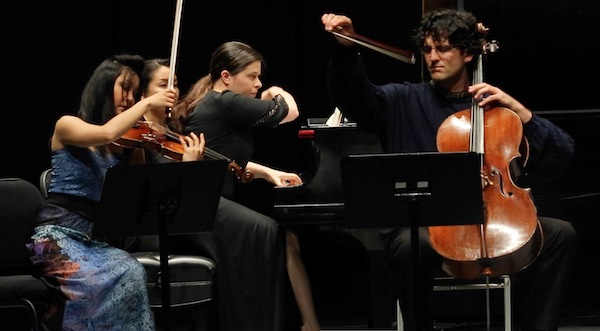
Surprises of a summer afternoon
By Sebastian Spreng, Visual Artist and Classical Music Writer
The promised grand finale of the XXI Mainly Mozart Festival not only met expectations but also surpassed them, and provided pleasant extra surprises that went beyond the strictly musical. It was comforting to attend a chamber music concert at the Arsht Center’s vast and acoustically superb Knight Concert Hall on the first day of summer, right in the middle of the World Cup soccer series, and find the venue packed with more than 2,000 patrons. More than an achievement, it was a true feat on the part of organizers and a defeat for those who insist there’s no audience for classical music during the torrid Miami summer.
Several factors accounted for the evening’s success. Foremost was the well-chosen program, comprising accessible works that combined the well-known with the rare, were performed by three distinguished artists and finished with a choreographed piece featuring excellent dancers from the Miami City Ballet. Though the dance was the least remarkable part of the evening, it attracted a large portion of an audience also drawn by the affordable ticket prices (all seats, $20).
The concert embraced a theme that specially resonates in a city like Miami, “The Motherland”, that far way home expressed in music and fueled by memory and nostalgia. The theme of exile and diaspora, of the “wandering nation” from Slavic, Russian and Jewish perspectives was expressed in musical gems by Rachmaninoff, Bloch, Bartok, Tsintsadze and Dvorak. Introducing each piece, a usually high-risk practice turned out to be effective thanks to Frank Cooper’s sweet-and-short narration, imaginatively illustrated by Ali Habashi’s videos.
Responsible for this musical “goal” is Ukrainian pianist Marina Radiushina, the series’ artistic director. She excelled in a refreshing solo made up of transcriptions of Rachmaninoff songs – Lilacs and Spring Waters – reinforcing the remarkable impression left by her participation in the rest of the program.
While prize-winning Canadian pianist Yi-Jia Susanne Hou showed her expected virtuosity in Ravel’s Tzigane and Bartok’s Romanian Folk Dances, Amit Peled’s cello truly dazzled, thanks to his sovereign musicality and charisma. In Ernest Bloch’s Prayer (from Jewish Life) and Glazunov’s Minstrel’s Song, he captivated the audience with a depth and opulent sound, able to span an extremely wide range without compromising style or technique. Nevertheless, it was in Sulkhan Tsintsadze’s Five Pieces on Folk Themes that the Israeli cellist, seconded by Radiushina’s requisite fierceness, delivered the high point of the evening, displaying truly exceptional, yet always restrained, musical resources. Peled, who is a star returning to the local scene for the third time, should come back soon. A performance of Bach’s Suites on the cello Pablo Casals left him could well make history.
Two classic trios of the chamber repertoire exquisitely framed the program. An expressive rendition of Rachmaninoff’s Trio Elegiaque set the tone for the evening, and a selection from Dvorak’s Dumky brought it to a triumphant close. For the latter piece, dancers from the Miami City Ballet joined the three instrumentalists with an effective choreography by Adriana Pierce. This original marriage of chamber music and dance on stage worked most of the time.
An unexpected bonus, the pas-de deux from Paul Schoenfield’s Café Music proved somewhat anti-climactic in a concert that, between acknowledgments and pauses, had already gone on too long.
A sensational musical afternoon against which neither sun and beach, nor Sunday, nor soccer could prevail. Good music emerged victorious, and highlighted the need for Miami to unite behind a project that merits the support. The audience is there, ready, willing and able. Let’s not keep it waiting.
Recent Content
-
Artsarticle ·
-
Artsarticle ·
-
Artsarticle ·

